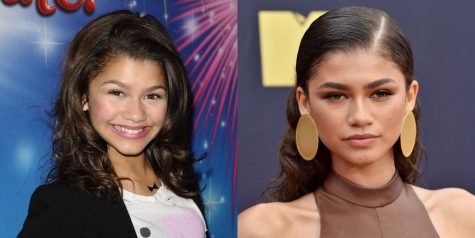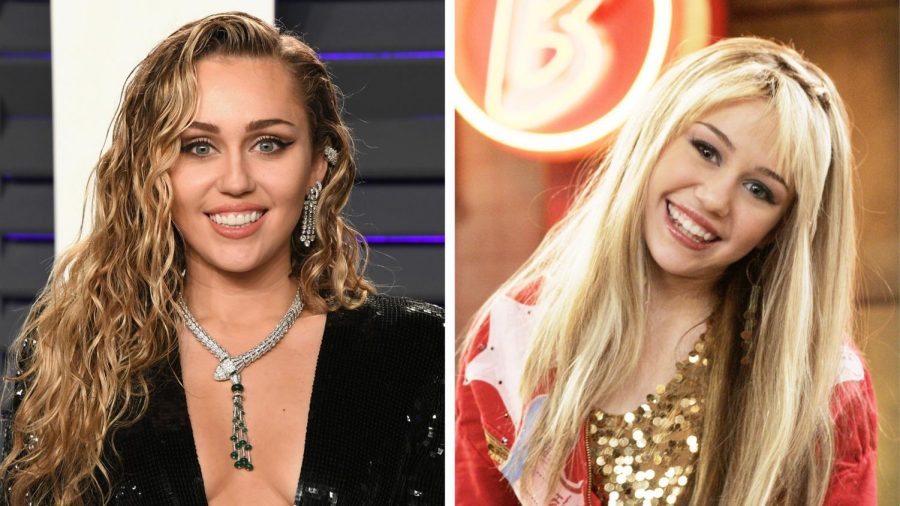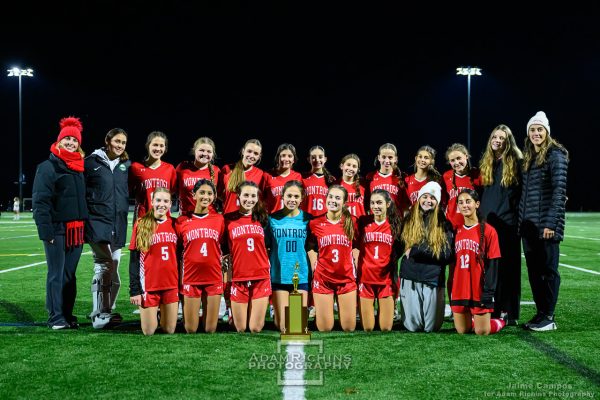Our Generation’s Obsession with Fame
Miley Cyrus now (left) vs Miley Cyrus in Hannah Montana (right).
When you were younger, I’m sure one of the responses you gave when someone asked what you wanted to be when you grow up was “a pop star” or “a movie star” or even just “famous.” In fact, when I asked many of my friends this same question in preparation for this article, their responses did not shock me. That’s not to say that I’m not guilty of this as well, as I have specific memories of telling my parents at the age of seven that one day I was going to be a famous pop star. However, what I found interesting was that when I asked my older relatives what they had wanted to be when they grew up, I received very different answers. Much more realistic professions such as “a veterinarian” and “a police officer” were brought up. This got me thinking, “Why is it that our generation specifically idolizes fame?” After pondering this question further, I came to one clear culprit: the media we’ve been consuming for our entire childhoods.
Because I have an older sister, I began watching the Disney Channel at a pretty young age. That is to say I basically watched whatever they broadcasted from 2007-2017 (from when I was 2 to when I was 12). Although I did not take notice at the time, so many of the shows and movies being presented were about the same thing: being or becoming famous. Don’t believe me? Allow me to spark your memory: Hannah Montana (2006-2011) followed a middle schooler named Miley Stewart, who lived a double life: normal kid by day, and pop star by night. Sonny With a Chance (2009-2011) centered around an average high school student named Sonny Monroe who is given the chance to be on her favorite TV show, launching her into stardom. Jonas (2009-2010) followed the complicated lives of the Jonas Brothers, as they navigated the balance between fame and being normal teenagers. Shake It Up (2010-2013) was about two teenagers named Rocky and CeeCee who get the chance to dance on their favorite TV show, causing them to immediately become famous. Austin and Ally (2011-2016) centered around a teenager named Austin Moon, who becomes an overnight sensation by posting videos on the internet of him singing his friend Ally’s songs, leading him to get a record deal. Liv and Maddie (2013-2017) was about two twins who are reunited when one of them returns home after making it big on TV. Bizaardvark (2016-2019) was about two best friends who go viral on the internet and as a result have wildly successful YouTube careers. And this is just the Disney Channel. Nickelodeon was not much better: iCarly (2007-2012) was about two middle schoolers who accidentally stumble upon fame when a video of them goes viral on the internet. Victorious (2010-2013) was about a group of teenagers who attended Hollywood Arts High School, a school that breeds the next generation of celebrities. (This is an example about a show that wasn’t necessarily about being famous, and more about becoming famous). Big Time Rush (2009-2013) was about a group of friends who enter a talent contest leading them to get discovered and become a famous boy band. And these are just TV shows. There are countless original movies created by these channels about the exact same thing. This was basically my long winded way of saying that a lot of the media our generation consumed when we were very young was centered around the idea of fame.

After my initial observation, I took to the internet to find that I was not the only person noticing a trend in children’s media. Researchers at UCLA published a psychology report titled Popular TV Shows Teach Children Fame is the Most Important Value in 2011. Sadly, its contents did not surprise me. “Fame is the number one value emphasized by television shows popular with 9-11 year olds, a dramatic change over the past 10 years,” says researcher Stuart Wolpert. Similarly, he concluded, “On a list of 16 values, fame jumped from the 15th spot, where it was in both 1987 and 1997, to the first spot in 2007.” And when we look at TV shows for kids ages 9-11 from the 1980s and 1990s for example, the difference in the general premise is clear. Some of the most popular shows for kids of those eras include Full House (1987-1995), Boy Meets World (1993-2000), and Saved By the Bell (1987-1992). Instead of fame, these shows depicted average people navigating their average lives. Maybe the reason past generations didn’t fantasize about fame as much as our generation did was because the idea of fame being attainable and essential wasn’t constantly being presented to them.
So what is the reason for this shift in the values being portrayed in children’s media? One theory I have is the rise of media during our childhoods that was specifically being marketed to kids ages 6-14. Nickelodeon, which launched in 1979, is historically the first channel specifically meant for children. However, the early shows being broadcasted were either cartoons (for example, Rugrats, Hey, Arnold!), or shows that were meant to be for the whole family, unlike the live action sitcoms, which make up a majority of their shows today. Similarly with the Disney Channel, which debuted in 1983, they only broadcasted Disney animated movies, specials, and short films at first. So when channels such as ABC Family and Cartoon Network began dominating the “for the whole family” and cartoon genre of television, it would make sense that Nickelodeon and Disney Channel wanted to switch their target audience. Both channels began broadcasting live action sitcoms targeted at kids ages 6-14 during the early 2000s (just in time for our generation to start watching these channels). My thinking is that since their stars were mainly in the same age range as their viewers (leading to more child stars than ever before), the channels’ aim to romanticize fame served only as a strategy to have viewers idolize their stars, making their shows more popular. My second theory is much simpler and more plausible: These large enterprises just wanted money. Allow me to explain. One of the earlier shows that depicted a famous child protagonist was Hannah Montanna. Miley Cyrus, who played the leading role, got launched into a singing career by Disney much like the one she had on the show. Essentially, the more people who supported Miley’s music, the more people watched her show, and vice versa. This was because of the similarities between the music she sang on her show and the music she came out with herself. Miley Cyrus’ singing career resulted in making her show one of the most popular programs Disney broadcasted at the time, and making them more money than they were making off of any other show (It is said that her Disney tours alone made them over 1 billion). Since this strategy had worked so well with Miley, why couldn’t Disney repeat their success with their other shows with similar premises? And, what was stopping Nickelodeon from doing the same? Disney and Nickelodeon would go on to launch a majority of their stars into singing careers, not only making them more money than ever before, but also creating the next generation of A List celebrities. Familiar faces such as Miley Cyrus, the Jonas Brothers, Demi Lovato, Selena Gomez, Zendaya, Dove Cameron, Ross Lynch, Olivia Rodrigo, and Ariana Grande all got their start on either the Disney Channel or Nickelodeon, and on shows about being famous. With all of this being said, what long term effect has this shift had on our culture? Patricia Greenfield, a psychology professor and director of the Children’s Digital Media Center at UCLA, answered this question directly. She said: “The rise of fame in preteen television may be one influence in the documented rise of narcissism in our culture,” and “Popular television shows are part of the environment that causes the increased narcissism, but they also reflect the culture. They both reflect it and serve as a powerful socialization force for the next generation.” And, especially with the rise of social media and internet fame, becoming famous is more attainable than ever.
So, why is it bad to idolize fame? An obvious answer that has been reiterated many times is: fame is not synonymous with happiness. In fact, so many former child stars recently opened up about what their experiences with fame were actually like. In an article published by Insider titled, 17 Former Child Stars Who Have Opened Up About the Price of Fame, Alyson Stoner (of Cheaper by the Dozen and Camp Rock) said, “While traversing extreme peaks and valleys of global fame, hidden medical hospitalizations, artistic milestones, rapid adultification, and multi-layered abuse I wish on no one, I narrowly survived the toddler-to-trainwreck pipeline.” Sadly, she is not the only one who has shared that experience. Rivkah Reyes (of School of Rock) saying that she “felt unsafe existing” because of obsessive fans and feeling sexualized while barely a teen. Another harmful effect of idolizing fame is that recent studies actually show parents are losing influence on their children, due to children living most of their lives on the internet, seeking fame. Patricia Greenfield, who ran this study, saying, “With Internet celebrities and reality TV stars everywhere, the pathway for nearly anyone to become famous, without a connection to hard work and skill, may seem easier than ever. When being famous and rich is much more important than being kind to others, what will happen to kids as they form their values and their identities?”
by Chloe Stefani ’24, Fashion Editor
24chloestefani@montroseschool.org











